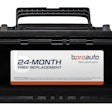Schwan’s Home Service began using propane fueled trucks over 40 years ago and recently announced plans to add 200 more autogas trucks upfitted by Roush CleanTech.
And they’re not stopping there. The Minnesota-based company plans on leasing an additional 400 propane trucks by year’s end.
With most of the alternative fuel headlines focusing on electric and hydrogen fuel cell vehicles, it’s worth remembering that autogas ranks as the third most popular fuel in the world.
Hard Working Trucks recently caught up with Schwan’s and Roush CleanTech to learn more about this decades old alternative fuel which continues to expand its reach among commercial fleets.
Special thanks to Danielle Stariha, senior manager of fleet and procurement for Schwan’s Home Service and Roush CleanTech President Todd Mouw for taking the time to answer our questions. The interviews were conducted separately. Stariha is first up to bat in Part 1, followed by Mouw in Part 2 tomorrow.
HWT: Please describe the benefits realized in using propane vehicles (i.e., emissions, operational and maintenance costs, etc.).
Stariha: First, I think it’s important to understand Schwan’s Home Service’s (a subsidiary of Schwan’s Company) history with propane.
The founder of the company—the late Marvin Schwan—first pursued propane powered trucks in the 1970s when the country was experiencing gasoline embargoes. He originally saw it as a way to ensure a reliable fuel source. As we gained experience, we grew to learn of other benefits of using propane:
- It burns cleaner than traditional fossil fuels, reducing our environmental impact. By using propane, Home Service reduces the country’s consumption of gas and diesel.
- It’s typically less expensive than gasoline or diesel.
- We can buy in bulk and fuel our own trucks at our facilities.
At the beginning of 2018 about 64 percent of our fleet ran on propane, and we expect this to jump to more than 70 percent by the end of the year.
Simply put, propane is clean, economical and domestically produced. Our primary metric in determining fiscal savings is cost per mile and propane succeeds with lower fuel and maintenance costs. Each of our new Ford E-450 propane autogas trucks emits about 91,000 fewer pounds of carbon dioxide emissions over its lifetime than a gasoline-powered vehicle. Propane also has no cold-weather start issues and a quieter engine performance, which our drivers appreciate.
HWT: How does Schwan’s plan on handling fueling arrangements for its growing autogas fleet?
Stariha: Because of our long-term use of propane, we have onsite fueling stations that we use to fuel our propane-powered vehicles. Since we have almost 400 depots, this ensures that fueling is easy and accessible.
HWT: Does Schwan’s advertise to the public that it’s using propane vehicles (including labeling its trucks)? If so, what kind of feedback has the company received thus far from its customers?
Stariha: Through the years, the media occasionally does a story on our use of propane, and people are generally surprised by it. Historically, we have not done a lot of advertisement about the issue, but it’s something that’s mentioned in our corporate responsibility report: https://www.schwanscompany.com/pdf/sustainability-report.pdf.
Starting in 2017, each of our new propane trucks has a “clean-burning propane fuel” decal that we designed for the cab, on both driver and passenger sides. It’s a part of our corporate culture that we are proud of, and if customers ask what it means, we are happy to explain.
We have received positive feedback from our supply chain partners. They appreciate working with a company that focuses on environmental responsibility.
HWT: Why the decision to use propane and not another alternative fuel like CNG?
Stariha: We are continuously evaluating our fuel options, but we remain committed to propane. We have infrastructure in place for propane and the vehicle range with propane is more ideal for our delivery needs. Overall, propane delivers the lowest total ownership cost for our application.
HWT: How are drivers and other company employees responding to the news of Schwan’s decision to run hundreds of propane vehicles?
Stariha: Our drivers and employees are familiar with our use of propane vehicles since we’ve been operating on the alternative fuel for more than four decades. Drivers enjoy the quieter engine. They are excited about ROUSH CleanTech’s E-450 chassis and its known powerful performance with a 6.8L V10 engine.
HWT: What kind of vehicles (make, model, year and fuel type) will the new propane models be replacing?
Stariha: The new propane vehicles replace aging class 4 vehicles that operate on gasoline or diesel, as well as replacing older propane units. Because we have one of the larger privately held fleets in the U.S., we are regularly purchasing new vehicles with the goal to reduce emissions.
HWT: Please describe any differences in performance between Schwan’s conventional vehicles and the propane models.
Stariha: Our Schwan’s Home Service vehicles operate in all types of terrains, climates and conditions across the nation. Ford and ROUSH CleanTech offer a proven platform and these new propane vehicles maintain the same horsepower and torque as Ford’s conventionally fueled vehicles.
HWT: How does fuel economy in Schwan’s propane vehicle compare to its conventional counterpart?
Stariha: Because a gallon of propane has less energy than a gallon of gasoline or diesel, the fuel economy of propane vehicles is a bit lower. But, due to the low cost of propane, over the long-term, we have found propane to be much less expensive than gasoline or diesel. We also buy in bulk which helps us secure a lower price.
HWT: Was Schwan’s able to use any incentives to help defray vehicle purchase costs? If so, briefly describe.
Stariha: Schwan’s is exploring incentives and rebates.
HWT: What advice would you give to fleets that are considering adding propane vehicles to their fleets?
Stariha: Propane has been a good option for us over the past 44 years. I would encourage fleet managers to research all of the options available and talk with fleet managers who operate propane autogas vehicles. If propane will work best for your fleet, then make sure to purchase from a company that will support your purchase and any service and warranty issues afterward.










